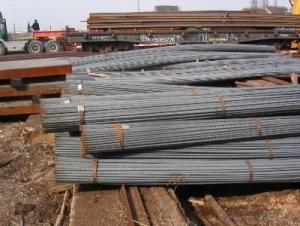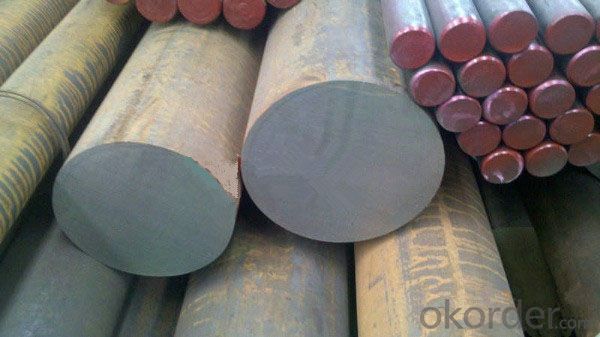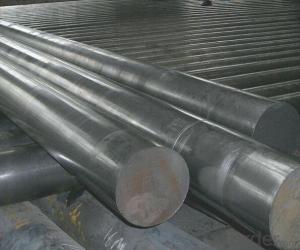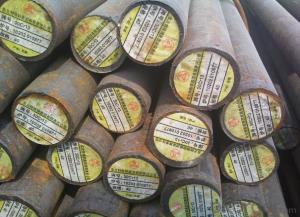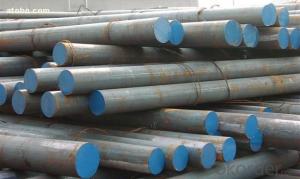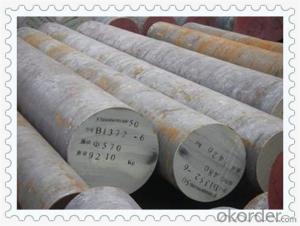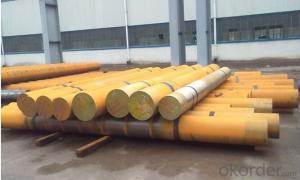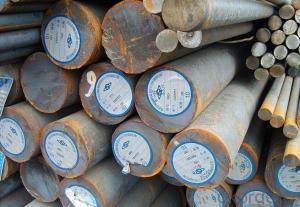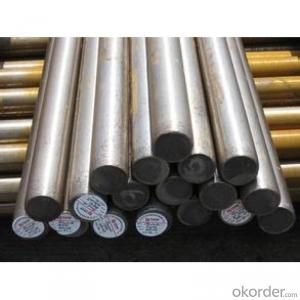H13 Round bar Special Steel Carbon Steel
- Loading Port:
- China main port
- Payment Terms:
- TT OR LC
- Min Order Qty:
- 25 m.t.
- Supply Capability:
- 10000 m.t./month
OKorder Service Pledge
OKorder Financial Service
You Might Also Like
Specification
Chemical Composition%
| Country | Standard | C | Si | Mn | Cr | Mo | V | S | P |
| China(GB) | 4Cr5NoSiV1 | 0.32-0.45 | 0.80-1.20 | 0.20-0.50 | 4.75-5.50 | 1.10-1.75 | 0.80-1.20 | ≤0.030 | ≤0.030 |
| USA(ASTM) | H13 | 0.32-0.45 | 0.80-1.20 | 0.20-0.50 | 4.75-5.50 | 1.10-1.75 | 0.80-1.20 | ≤0.030 | ≤0.030 |
| Germany(DIN) | 1.2344 | 0.37-0.42 | 0.90-1.20 | 0.30-0.50 | 4.80-5.50 | 1.20-1.50 | 0.90-1.10 | ≤0.030 | ≤0.030 |
| Japan(JIS) | SKD61 | 0.37-0.42 | 0.90-1.20 | ≤0.50 | 4.50-5.50 | 1.00-1.50 | 0.80-1.20 | ≤0.030 | ≤0.030 |
Available Size
Rolled round bar:φ12-80mm × L
Forged round bar:φ85-600mm × L
Characterstics
| 1.Higher thermal strength and hardness | ||||||
| 2.Better toughness and elevated temperature fatigue resistance | ||||||
| 3.Hardness maintaining ability at 600℃ | ||||||
| 4.Good polishing performance |
Applications: Suitable for aluminum and copper die-casting moulds working for long time at elevated temperatures,hot extrusion dies,core rod forging dies,plastic moulds,etc,also suitable for heat resistance thimbles,push rods and ejector sleeves


1, Your advantages?
professional products inquiry, products knowledge train (for agents), smooth goods delivery, excellent customer solution proposale
2, Test & Certificate?
SGS test is available, customer inspection before shipping is welcome, third party inspection is no problem
3, Payment Terms?
30% TT as deposit and 70% before delivery.
Irrevocable L/C at sight.
4, Trading Terms?
EXW, FOB, CIF, FFR, CNF
6, After-sale Service?
We provides the services and support you need for every step of our cooperation. We're the business partner you can trust.
For any problem, please kindly contact us at any your convenient time.
We'll reply you in our first priority within 24 hours.
- Q: What are the different forms of special steel available in the market?
- There are several different forms of special steel available in the market, including stainless steel, alloy steel, tool steel, high-speed steel, and carbon steel. Each of these forms has its own unique properties and uses, making them suitable for various applications in industries such as construction, automotive, manufacturing, and aerospace.
- Q: What are the requirements for special steel used in renewable energy equipment manufacturing?
- The requirements for special steel utilized in the manufacturing of renewable energy equipment differ significantly from traditional steel used in other industries. In order to meet the demanding nature of renewable energy equipment, the steel must possess certain unique characteristics and properties to ensure optimal performance and durability. 1. Excellent corrosion resistance is a necessity for special steel used in renewable energy equipment, as it must be able to withstand exposure to harsh environmental conditions. This is especially crucial for offshore wind turbines or solar panels that are installed in coastal areas with high salt content in the air. 2. The steel should possess high strength and toughness to withstand mechanical stresses and loads. Renewable energy equipment, such as wind turbine towers or hydroelectric dams, experiences significant forces such as strong winds, water pressure, or vibrations. Steel with high strength provides the necessary structural integrity to handle these forces. 3. Given the cyclic nature of renewable energy equipment, the steel must have excellent fatigue resistance. Wind turbines, for instance, constantly experience alternating loads due to wind gusts and rotational forces. Specially designed steel with fatigue resistance properties can prevent structural failures caused by repeated stress. 4. Weldability is a crucial requirement for the steel used in renewable energy equipment manufacturing. Many components of renewable energy systems require welding, and the steel must be easily weldable without compromising its strength or other properties. 5. The steel used in renewable energy equipment should align with the objective of environmental sustainability. Steel manufacturers are increasingly focusing on reducing the carbon footprint of their products by incorporating recycled content or adopting greener production processes. 6. Special steel used in renewable energy equipment must also be cost-effective while meeting all the aforementioned requirements. The steel should provide the desired properties at a reasonable cost to ensure the competitiveness and viability of renewable energy projects. To fulfill these requirements, steel manufacturers often develop specific grades or alloys tailored to the needs of renewable energy equipment manufacturers. These grades continuously evolve as the renewable energy industry advances, enabling the production of more efficient and durable equipment that supports the transition to clean energy sources.
- Q: How is corrosion-resistant tool steel used in the production of molds and dies?
- Corrosion-resistant tool steel is commonly used in the production of molds and dies due to its ability to withstand exposure to corrosive environments. This steel helps to prevent rust and degradation, ensuring that the molds and dies maintain their structural integrity and dimensional accuracy over time. By using corrosion-resistant tool steel, manufacturers can produce high-quality molds and dies that are durable and resistant to wear and tear, ultimately improving the overall efficiency and longevity of the production process.
- Q: What are the different applications of special steel in the construction industry?
- Special steel has various applications in the construction industry, including the production of structural elements like beams and columns, reinforcing bars, and fasteners. It is also used in the manufacturing of high-strength and corrosion-resistant components for bridges, high-rise buildings, and infrastructure projects. Additionally, special steel finds application in the construction of offshore platforms, pipelines, and other critical structures that require exceptional durability and performance.
- Q: What are the main characteristics of alloy steel?
- Alloy steel is a type of steel that is made by adding certain elements, such as chromium, nickel, or molybdenum, to iron. These additional elements give alloy steel its unique properties and characteristics. Some of the main characteristics of alloy steel include: 1. High strength: Alloy steel is known for its exceptional strength. The addition of alloying elements enhances the steel's ability to withstand high pressures and heavy loads, making it ideal for applications that require a strong and durable material. 2. Hardness: Alloy steel is also known for its hardness. It has a higher level of hardness than regular carbon steel, which makes it resistant to wear, abrasion, and deformation. This characteristic makes alloy steel suitable for applications where resistance to impact or wear is crucial, such as in the manufacturing of cutting tools or machinery parts. 3. Corrosion resistance: Depending on the specific alloying elements added, alloy steel can exhibit excellent resistance to corrosion. Chromium, for example, is commonly added to alloy steel to create stainless steel, which is highly resistant to rust and corrosion. This characteristic makes alloy steel a preferred material in industries where exposure to moisture or corrosive environments is common. 4. Heat resistance: Alloy steel is known for its ability to withstand high temperatures without losing its strength or structural integrity. The addition of elements like nickel, molybdenum, or vanadium enhances the steel's ability to resist thermal expansion, oxidation, and softening at elevated temperatures. This characteristic makes alloy steel suitable for applications in the aerospace, automotive, and power generation industries. 5. Versatility: Alloy steel is a versatile material that can be easily customized to meet specific requirements. By varying the composition and proportions of alloying elements, manufacturers can create alloy steel with a wide range of properties, such as improved ductility, toughness, or electrical conductivity. This versatility allows alloy steel to be used in various industries, including construction, manufacturing, and engineering. Overall, the main characteristics of alloy steel are high strength, hardness, corrosion resistance, heat resistance, and versatility. These properties make alloy steel a preferred choice for a wide range of applications that require a strong, durable, and reliable material.
- Q: How does special steel contribute to the infrastructure sector?
- Special steel plays a crucial role in the infrastructure sector by contributing to the construction and maintenance of various structures. It is widely used in the sector due to its exceptional strength, durability, and resistance to wear and tear. One of the key areas where special steel makes a significant contribution is in the construction of bridges. Bridges are subjected to heavy loads, extreme weather conditions, and constant vibrations, making the use of high-quality steel essential. Special steel, such as high-strength low-alloy (HSLA) steel or weathering steel, provides the necessary strength and corrosion resistance to ensure the longevity and safety of bridges. Moreover, special steel is also extensively utilized in the construction of high-rise buildings and skyscrapers. These structures require steel that can withstand tremendous loads and provide stability. Special steel grades, such as high-strength steel or structural steel, offer the necessary strength-to-weight ratio, allowing architects and engineers to design taller and more robust structures. In addition to its usage in construction, special steel also contributes to the infrastructure sector through its application in manufacturing equipment and machinery used for construction and maintenance activities. It is used in the production of heavy machinery, cranes, excavators, and other construction equipment, providing the necessary strength and reliability to withstand the demanding conditions of the sector. Furthermore, special steel is crucial in the development of transportation infrastructure. It is used in the manufacturing of railway tracks, ensuring their durability and resistance to wear caused by the continuous movement of trains. Additionally, it is used in the production of reinforcing bars for concrete in road construction, providing the necessary strength and stability to withstand heavy traffic loads. Overall, special steel's exceptional properties make it an indispensable material in the infrastructure sector. Its strength, durability, and resistance to corrosion contribute to the construction and maintenance of various structures, ensuring their longevity, safety, and reliability.
- Q: Can special steel be used in the computer manufacturing industry?
- Yes, special steel can be used in the computer manufacturing industry. It is often used for making computer casings, hard drive components, and other structural parts due to its high strength, durability, and resistance to corrosion.
- Q: What are the properties of high-strength alloy steel?
- High-strength alloy steel possesses several key properties that make it desirable for various applications. It has excellent tensile strength, allowing it to withstand heavy loads and resist deformation. The steel also exhibits high toughness, making it resistant to fracture even under extreme conditions. Furthermore, it offers exceptional corrosion resistance, ensuring longevity and durability in harsh environments. Additionally, high-strength alloy steel often maintains its properties at elevated temperatures, making it suitable for high-pressure and high-temperature applications.
- Q: How does special steel contribute to the electrical industry?
- The electrical industry relies heavily on special steel to produce a wide range of components and equipment required for the generation, transmission, and distribution of electricity. Power transformers, for instance, heavily rely on special steel. These transformers are crucial for adjusting voltage levels in the electricity grid, allowing for efficient transmission and distribution of electricity. Special steel, thanks to its exceptional strength, durability, and magnetic properties, is employed to construct the cores of these transformers. The high magnetic permeability of special steel ensures minimal energy loss during the transformation process, resulting in more efficient power transmission. In addition, special steel is extensively used in the manufacturing of electrical conductors, such as wires and cables. These conductors are responsible for transporting electricity from power plants to various end-use applications. Special steel wires boast excellent conductivity and resistance to corrosion, making them ideal for transmitting electricity over long distances with minimal energy loss. Moreover, special steel is employed in the production of electrical connectors and terminals, ensuring secure and reliable connections between different electrical components. The electrical industry also relies on special steel for the fabrication of electrical motors and generators. The exceptional strength and magnetic properties of special steel contribute to the efficient conversion of electrical energy into mechanical energy, ensuring the smooth operation of motors and generators. Furthermore, special steel is used in the manufacturing of electrical switches, circuit breakers, and other protective devices, guaranteeing the safe and reliable functioning of electrical systems. Overall, special steel plays an indispensable role in the electrical industry by enabling the production of essential components and equipment necessary for the generation, transmission, and distribution of electricity. Its unique properties contribute to enhanced energy efficiency, reliability, and safety in electrical systems, cementing its status as an indispensable material in this industry.
- Q: Can special steel be used for structural applications?
- Yes, special steel can be used for structural applications. Special steel refers to steel that has been alloyed or modified to possess specific properties such as enhanced strength, durability, or corrosion resistance. These qualities make special steel suitable for various structural applications where high performance and reliability are required, such as in the construction of buildings, bridges, and offshore platforms.
Send your message to us
H13 Round bar Special Steel Carbon Steel
- Loading Port:
- China main port
- Payment Terms:
- TT OR LC
- Min Order Qty:
- 25 m.t.
- Supply Capability:
- 10000 m.t./month
OKorder Service Pledge
OKorder Financial Service
Similar products
Hot products
Hot Searches
Related keywords
